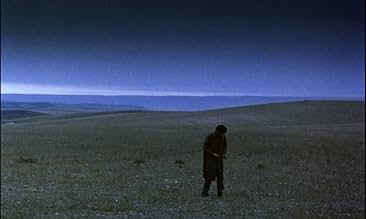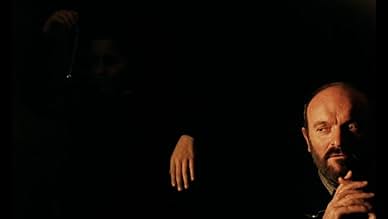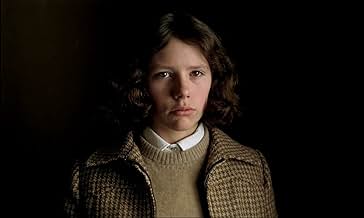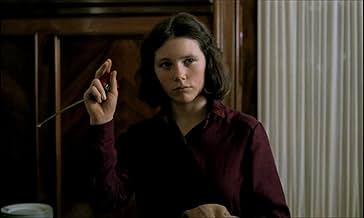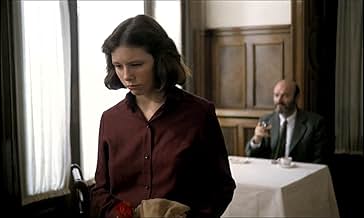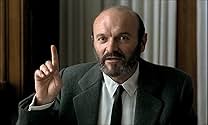NOTE IMDb
7,8/10
6,9 k
MA NOTE
Ajouter une intrigue dans votre langueA woman reflects on her childhood relationship with her father, attempting to understand the depths of his despair and the truth of his myths.A woman reflects on her childhood relationship with her father, attempting to understand the depths of his despair and the truth of his myths.A woman reflects on her childhood relationship with her father, attempting to understand the depths of his despair and the truth of his myths.
- Réalisation
- Scénario
- Casting principal
- Récompenses
- 7 victoires et 2 nominations au total
Aurore Clément
- Irene Ríos
- (as Aurora Clement)
- …
José Luis Fernández 'Pirri'
- Carioco
- (voix)
- (non crédité)
José García García Morilla
- Chófer
- (non crédité)
Chus Lampreave
- Casilda
- (non crédité)
Jesús Nieto
- Agustín Arenas- voz
- (non crédité)
Avis à la une
10jsorribe
After "The Spirit of the Beehive" Erice retakes post-civil war Spain through the eyes of a child (and later a teenager in this case). Not only the director recreates admirably the atmosphere of those gloomy years in my country, but also succeeds in showing the relationship between a bitter, low-spirited father and his vital daughter. Wonderful cinematography and sets also contribute to create a masterwork in which every camera move, every dialogue line and every fade constitute a brilliant piece of its own. An absolute must for all cinema lovers.
Victor Erice's little masterpiece earned itself a permanent place in the repertoire of Spanish film-making. Not surprisingly: Franco was dead and Spain had bravely struggled out of a difficult transition to form a now much-respected democratic and modern nation. If art - whether literature or cinema - is to reflect that important step in a country's advance, perhaps "El Sur" (The South) is one of the four or five Spanish films of the last twenty five years which best marked that change.
Beautifully filmed in natural lighting, even in the interior of an old rural house (Ezcaray, La Rioja), the deep feelings transmitted between daughter and father reveal a delicacy so often missing in more banal entertainment. Young Sonsoles Aranguren and Icíar Bollaín play delicious roles which swing rather uncertainly from late adolescence to young womanhood as the daughter who attempts to fathom out her father (and in so doing, herself) with an extraordinarily powerful performance which obliges the intelligent viewer into the film. And Omero Antonutti plays the exact counterpart, carefully balancing his role such that he never overshadows his "daughter's" interpretation. The scenes and dialogues are enchanting, never over-acted or otherwise exaggerated; at all moments Erice maintains full control over the film's development, giving just enough touch of exquisiteness and sensitivity, allowing the film to move unhurriedly through simple but moving scenes to the predictable outcome.
Here indeed is moving theatre-cinema: the understanding spectator will leave with a certain mixture of feelings if he knows a little of Spain and its people; he will not leave unmoved, cold.
Beautifully filmed in natural lighting, even in the interior of an old rural house (Ezcaray, La Rioja), the deep feelings transmitted between daughter and father reveal a delicacy so often missing in more banal entertainment. Young Sonsoles Aranguren and Icíar Bollaín play delicious roles which swing rather uncertainly from late adolescence to young womanhood as the daughter who attempts to fathom out her father (and in so doing, herself) with an extraordinarily powerful performance which obliges the intelligent viewer into the film. And Omero Antonutti plays the exact counterpart, carefully balancing his role such that he never overshadows his "daughter's" interpretation. The scenes and dialogues are enchanting, never over-acted or otherwise exaggerated; at all moments Erice maintains full control over the film's development, giving just enough touch of exquisiteness and sensitivity, allowing the film to move unhurriedly through simple but moving scenes to the predictable outcome.
Here indeed is moving theatre-cinema: the understanding spectator will leave with a certain mixture of feelings if he knows a little of Spain and its people; he will not leave unmoved, cold.
This story unfolds in delicate time in the history of modern Spain, as well as during a precarious time in the life of a family.
Adolescent Estrella lives in awe of her mysterious and magical father, wonderfully played by Omero Antonutti, and weary of her ever-practical mother and of their isolated life in the misty and brooding northern countryside. Estrella's fascination with her father turns to intrigue- and then to obsession- when she discovers that her father has a secret, and realizes that she is only one facet of her father's life and not the central figure, as he is to her.
After a ray of sunshine is cast into her dark and insular life by the visit of one of her father's aunts (played by the late Rafaela Aparicio in one of her best roles), Estrella yearns to capture more of the essence of her father by one day visiting "el sur" (the south)his home territory.
As Estrella enters the awkward realm of adolescence, she grows apart from her father emotionally. A tragic turn of events condemns him to remain a mythical figure for hersomeone she wonders if she ever knew at all. The supreme irony is that she is very like him.
This film is captivating, both visually and emotionally, and the audience becomes just as absorbed in the story as the characters themselves. It is one of those films whose imagery will always stay in one's memory, such as in the my favorite scene, where father and daughter sit distantly across a table from each other in an old café, listening to the eerie sound of a "pasodoble" that wafts from a wedding in another room, bringing memories of happier, simpler days.
Adolescent Estrella lives in awe of her mysterious and magical father, wonderfully played by Omero Antonutti, and weary of her ever-practical mother and of their isolated life in the misty and brooding northern countryside. Estrella's fascination with her father turns to intrigue- and then to obsession- when she discovers that her father has a secret, and realizes that she is only one facet of her father's life and not the central figure, as he is to her.
After a ray of sunshine is cast into her dark and insular life by the visit of one of her father's aunts (played by the late Rafaela Aparicio in one of her best roles), Estrella yearns to capture more of the essence of her father by one day visiting "el sur" (the south)his home territory.
As Estrella enters the awkward realm of adolescence, she grows apart from her father emotionally. A tragic turn of events condemns him to remain a mythical figure for hersomeone she wonders if she ever knew at all. The supreme irony is that she is very like him.
This film is captivating, both visually and emotionally, and the audience becomes just as absorbed in the story as the characters themselves. It is one of those films whose imagery will always stay in one's memory, such as in the my favorite scene, where father and daughter sit distantly across a table from each other in an old café, listening to the eerie sound of a "pasodoble" that wafts from a wedding in another room, bringing memories of happier, simpler days.
His first film was a lucid, enigmatic and fascinating film entitled "The Spirit of the Beehive", about a young girl in post-Civil War Spain who becomes obsessed with finding the spirit of Frankenstein's monster. His second film, "The South", is nominally about the same things, the delicate and subsequently shattered innocence of childhood, the power of the cinema, and in a more direct yet completely oblique way, the effects that the Spainish Civil War had on that country, as 'the south' becomes to our protagonist this mythic enigma of a place functioning as both heaven and hell, mostly filled in by her father's former nanny's descriptions of the complex situation the war had, and the tossed-off manner in which the stories of the father and his father are delivered are engrossingly enigmatic, theoretically to keep from exposing a closed wound to the young child, but are given in such a vivid shorthand that all the buried truths are there to discover for any discerning viewers older than the protagonist.
The film chronicles a young girl named Estrella who is living in northern Spain who considers her father almost a deity, he is interesting, pleasant and in her eyes, possibly magic, as his enchantment towards mysticism seems to carry on to his daughter. But one day, she discovers a letter by her father where all that is written is a woman's name, over and over, and one night, he disappears for a time, and returns just as suddenly. As she grows older, she decides to follow him on a trip to a local theater, where she discovers the woman's name from the letter on a poster for the film currently playing. After the film, she tracks him down to a local café, where he is composing a letter to the female star of the film, a former lover who he would like to get reacquainted with. He receives a letter back, and soon afterwards, becomes curt, practically silent and emotionally distant, to the point that he seems cut off to the world.
The film's themes towards childhood innocence and lost loves are universal even as they appear bizarrely unique, and although there are a lot of odd details that are left hanging (her prospective admirer, who is a compulsive graffiti artist), they seem to enrich the specifics of this particular situation even as they enhance the general associative qualities of the story around them. The acting, from the Estrellas of both ages (Sonsoles Aranguren at 8, Iciar Bollain at 15) is pitch-perfect, and Omero Antonutti is impeccable, displaying an ability to put forth a wide range of emotions in a very select amount of movements and expressions, and whether he's lovingly essaying a letter to a past lover, or shutting the world out once his reply comes back, you may not always understand his motivations, but you get the sentiment, and you know exactly what he's going for, much in the way that a frowny face means 'sad', except that Antonutti has a range of about three inches on his face with which he brings forth this myriad of emotions.
The film's visuals have a wondrous, hypnotic lyricism to them, from the look to the style to the movement of the camera, something more impressive considering that the film is not all that stylistically obvious, there's nothing that makes you go, "Wow!", but it's there, and you feel it deep down in your soul. It's been too long since I've seen "The Spirit of the Beehive", but I seem to remember this quality being present there as well, and I liken it to the effect of "The Exorcist". There's nothing to make you SCREAM in the exorcist, they're no jump scares, no It Was Just a Cat moments, but the film has such a potent sense of overwhelming DREAD that it just crawls inside your skin and festers, to a glorious extent.
Now, this is not to say the film is without fault. The father's transition from "good dad who has a hang-up about an old relationship" to "full-on shut-in who hates everyone and never speaks to his family again" seemingly takes place within a matter of minutes (and that's FILM LIFE minutes, not just minutes of the movie), and the particulars of his former lover and their relationship are left frustratingly scant, and this doesn't seem like a situation where the act is all that matters, this could have been fleshed out to a more effect breadth, and although I do mostly understand the meaning of the finale, it doesn't make it any less jarringly sudden or unsatisfying. The fact that the film apparently ends only two-thirds of the way into the novel seems to support this conclusion. Also, almost all of the film is presented from the daughter's point of view, but there's several important chunks depicted from the father's perspective that, although informative from an expositional standpoint, seem to sort of reduce the delicate mystery and the effect it would have created had we stayed wholly with the girl.
The film is nowhere near as moving as the minor keys of "Beehive" were, but the film is captivating, engaging and never overstays its welcome (at a svelte 95 minutes), and is most definitely a worthwhile filmgoing experience that is worth hunting down and worth praying for the Criterion treatment for. Thanks, Vic, I can't wait to track down the other 33.3% of your filmography, because so far, you're 2-for-2.
{Grade: 8.25/10 (high B) / #13 of 1983}
The film chronicles a young girl named Estrella who is living in northern Spain who considers her father almost a deity, he is interesting, pleasant and in her eyes, possibly magic, as his enchantment towards mysticism seems to carry on to his daughter. But one day, she discovers a letter by her father where all that is written is a woman's name, over and over, and one night, he disappears for a time, and returns just as suddenly. As she grows older, she decides to follow him on a trip to a local theater, where she discovers the woman's name from the letter on a poster for the film currently playing. After the film, she tracks him down to a local café, where he is composing a letter to the female star of the film, a former lover who he would like to get reacquainted with. He receives a letter back, and soon afterwards, becomes curt, practically silent and emotionally distant, to the point that he seems cut off to the world.
The film's themes towards childhood innocence and lost loves are universal even as they appear bizarrely unique, and although there are a lot of odd details that are left hanging (her prospective admirer, who is a compulsive graffiti artist), they seem to enrich the specifics of this particular situation even as they enhance the general associative qualities of the story around them. The acting, from the Estrellas of both ages (Sonsoles Aranguren at 8, Iciar Bollain at 15) is pitch-perfect, and Omero Antonutti is impeccable, displaying an ability to put forth a wide range of emotions in a very select amount of movements and expressions, and whether he's lovingly essaying a letter to a past lover, or shutting the world out once his reply comes back, you may not always understand his motivations, but you get the sentiment, and you know exactly what he's going for, much in the way that a frowny face means 'sad', except that Antonutti has a range of about three inches on his face with which he brings forth this myriad of emotions.
The film's visuals have a wondrous, hypnotic lyricism to them, from the look to the style to the movement of the camera, something more impressive considering that the film is not all that stylistically obvious, there's nothing that makes you go, "Wow!", but it's there, and you feel it deep down in your soul. It's been too long since I've seen "The Spirit of the Beehive", but I seem to remember this quality being present there as well, and I liken it to the effect of "The Exorcist". There's nothing to make you SCREAM in the exorcist, they're no jump scares, no It Was Just a Cat moments, but the film has such a potent sense of overwhelming DREAD that it just crawls inside your skin and festers, to a glorious extent.
Now, this is not to say the film is without fault. The father's transition from "good dad who has a hang-up about an old relationship" to "full-on shut-in who hates everyone and never speaks to his family again" seemingly takes place within a matter of minutes (and that's FILM LIFE minutes, not just minutes of the movie), and the particulars of his former lover and their relationship are left frustratingly scant, and this doesn't seem like a situation where the act is all that matters, this could have been fleshed out to a more effect breadth, and although I do mostly understand the meaning of the finale, it doesn't make it any less jarringly sudden or unsatisfying. The fact that the film apparently ends only two-thirds of the way into the novel seems to support this conclusion. Also, almost all of the film is presented from the daughter's point of view, but there's several important chunks depicted from the father's perspective that, although informative from an expositional standpoint, seem to sort of reduce the delicate mystery and the effect it would have created had we stayed wholly with the girl.
The film is nowhere near as moving as the minor keys of "Beehive" were, but the film is captivating, engaging and never overstays its welcome (at a svelte 95 minutes), and is most definitely a worthwhile filmgoing experience that is worth hunting down and worth praying for the Criterion treatment for. Thanks, Vic, I can't wait to track down the other 33.3% of your filmography, because so far, you're 2-for-2.
{Grade: 8.25/10 (high B) / #13 of 1983}
I feel compelled to relate this as it has been at least ten years since I saw this film (in a student union theater) and it still has a powerful hold on my memory. I have been unable to find it on video, so my recollections are fragmentary.
I was so impressed, involved, and moved by this tale that I left the cinema feeling as if I were floating just above the pavement. One is quietly and adroitly drawn in by the mystery that the young daughter in 1950s Spain senses in her father. The political dimension is brilliantly nuanced, carefully alluded to without speechifying. The wondrous cinematography captures light so deftly at times that it is almost luminous: late afternoon sunlight across a room, snow slowly falling (viewed through a window), a rain soaked street at night. As the daughter grows to adolescence the enigma of her reticent father begins to clear. It may not sound like much in my words, but from wool Victor Erice has spun gold.
I was so impressed, involved, and moved by this tale that I left the cinema feeling as if I were floating just above the pavement. One is quietly and adroitly drawn in by the mystery that the young daughter in 1950s Spain senses in her father. The political dimension is brilliantly nuanced, carefully alluded to without speechifying. The wondrous cinematography captures light so deftly at times that it is almost luminous: late afternoon sunlight across a room, snow slowly falling (viewed through a window), a rain soaked street at night. As the daughter grows to adolescence the enigma of her reticent father begins to clear. It may not sound like much in my words, but from wool Victor Erice has spun gold.
Le saviez-vous
- AnecdotesDirector Víctor Erice considers this to be an unfinished project. The original script consisted of more than 400 pages and was scheduled to be shot in 81 days. 48 days into shooting, when production was to be moved to the south of Spain, producer Elías Querejeta unexpectedly suspended the project, allegedly because of financing objections by Televisión Española, the backing television network. However, Querejeta revealed years later that he made the decision because he thought the film was complete with what they'd shot so far.
- ConnexionsFeatured in Huellas de un espíritu (1998)
- Bandes originalesLa puerta del Sagrario
Composed by Enrique Granados
Meilleurs choix
Connectez-vous pour évaluer et suivre la liste de favoris afin de recevoir des recommandations personnalisées
- How long is El Sur?Alimenté par Alexa
Détails
- Date de sortie
- Pays d’origine
- Site officiel
- Langue
- Aussi connu sous le nom de
- Le Sud
- Lieux de tournage
- Sociétés de production
- Voir plus de crédits d'entreprise sur IMDbPro
Box-office
- Montant brut mondial
- 22 720 $US
Contribuer à cette page
Suggérer une modification ou ajouter du contenu manquant


